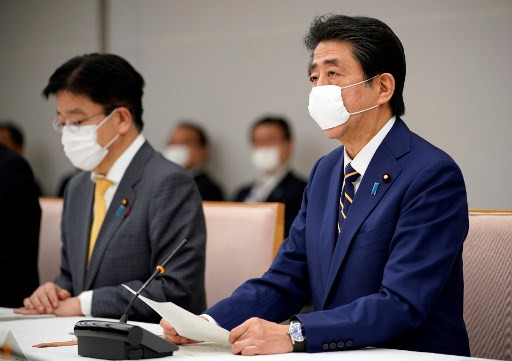Popular Reads
Top Results
Can't find what you're looking for?
View all search resultsPopular Reads
Top Results
Can't find what you're looking for?
View all search resultsWhat does a state of emergency mean for Japan?
So what does a state of emergency entail in the world's third-biggest economy?
Change text size
Gift Premium Articles
to Anyone
 Japan's Prime Minister Shinzo Abe (R) speaks as he declares a state of emergency during a meeting of a task force against the COVID-19 outbreak, at the prime minister's official residence in Tokyo on Tuesday. Abe declared a month-long state of emergency in Tokyo and six other parts of the country over a spike in coronavirus cases. (AFP/Franck Robinchon )
Japan's Prime Minister Shinzo Abe (R) speaks as he declares a state of emergency during a meeting of a task force against the COVID-19 outbreak, at the prime minister's official residence in Tokyo on Tuesday. Abe declared a month-long state of emergency in Tokyo and six other parts of the country over a spike in coronavirus cases. (AFP/Franck Robinchon )
J
apan's Prime Minister Shinzo Abe on Tuesday declared a state of emergency in several parts of the country, including Tokyo, where coronavirus infections are spiking.
But the measure falls far short of the lockdowns seen in other parts of the world. So what does a state of emergency entail in the world's third-biggest economy?
Which areas are affected?
The month-long declaration is not nationwide. It affects seven areas where medical experts believe the virus is now spreading rapidly, risking overloading the healthcare system.
It covers Tokyo and neighboring Chiba, Kanagawa and Saitama, the western hub of Osaka and neighboring Hyogo, as well as the southwestern region of Fukuoka.
Other parts of the country are not affected. In February, the governor of northern Hokkaido announced a localized state of emergency as cases increased, but lifted the measure after several weeks.
What does the measure allow?
The state of emergency empowers governors in affected regions to call for restrictions on movement and commerce but offers little in the way of enforcement.
Governors can request people stay inside -- something Tokyo's governor has effectively already done by asking people to limit unnecessary outings and work from home.
It also allows governors to call for businesses that attract large numbers of people, like entertainment venues or department stores, to close their doors.
But there are no punishments for those who defy the request, nor any other enforcement mechanisms.
Public transport is expected to continue running, though possibly on a more limited basis. Shops and other businesses may remain open.
So what can governors order?
The strongest power accorded governors is the ability to commandeer buildings or land for medical purposes.
This could mean requiring landowners to turn over property to build temporary medical facilities, or businesses to free up space for housing patients.
Governors can also close public institutions like schools, many of which have been shuttered since February after Abe urged a nationwide shutdown.
How will the public react?
While the measure does not contain strong enforcement measures, expectations are that most individuals and businesses will comply.
Many people have already heeded calls to work from home, with Tokyo's notoriously crowded transport system noticeably emptier in recent weeks.
And a request from the Tokyo governor for people to stay home on weekends has also resulted in significantly quieter streets, even in the sunny final days of cherry blossom season.
Japan's legal system, influenced by the legacy of wartime excesses, limits the government's power over its citizens.
Yasutoshi Nishimura, the minister in charge of the law implementing the state of emergency, said residents would be asked, not ordered.
"Our legal system is set up so that people as a whole unite and share the burden of preventing the spread of infection," rather than resorting to forcible measures, he said in parliament on Monday.
And there are signs the public is on board, with a poll published by private broadcaster TBS on Monday showing 80 percent of participants supported a declaration of emergency.
How is it declared?
The state of emergency measure comes from a revised 2012 bill intended to slow the spread of new strains of flu.
The declaration can only be made if certain conditions are met, including that a virus is spreading rapidly and having a significant impact on the lives of citizens and the economy.
To make such a determination, Abe is required to consult a taskforce convened for the purpose last month, which includes legal experts and medical professionals. They approved the declaration on Tuesday.









